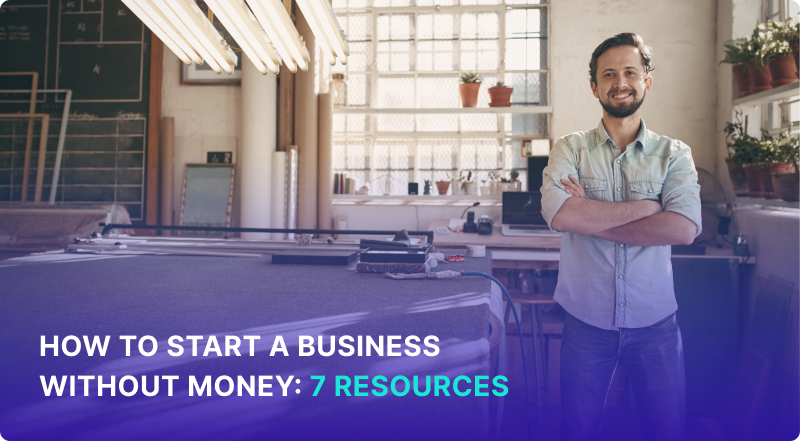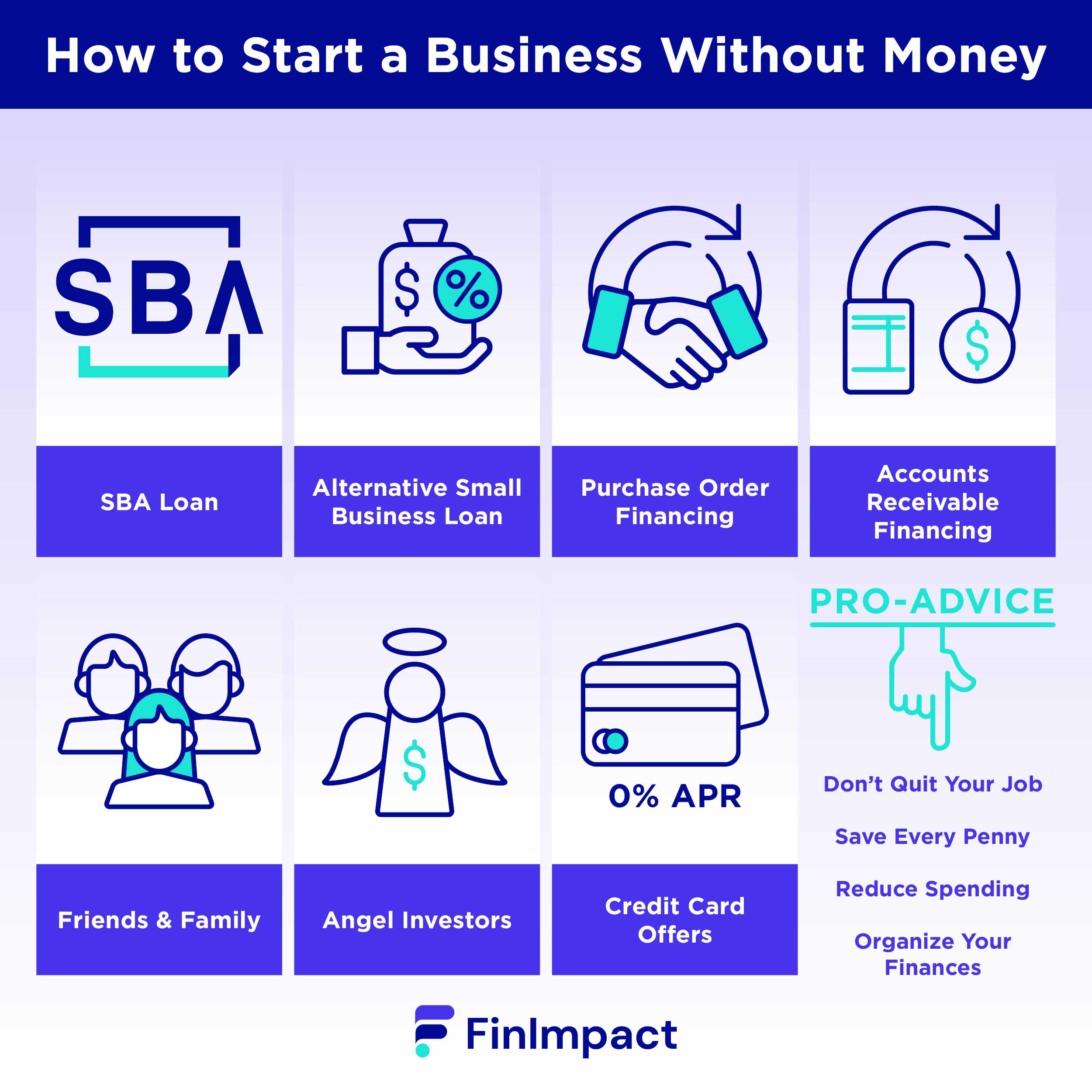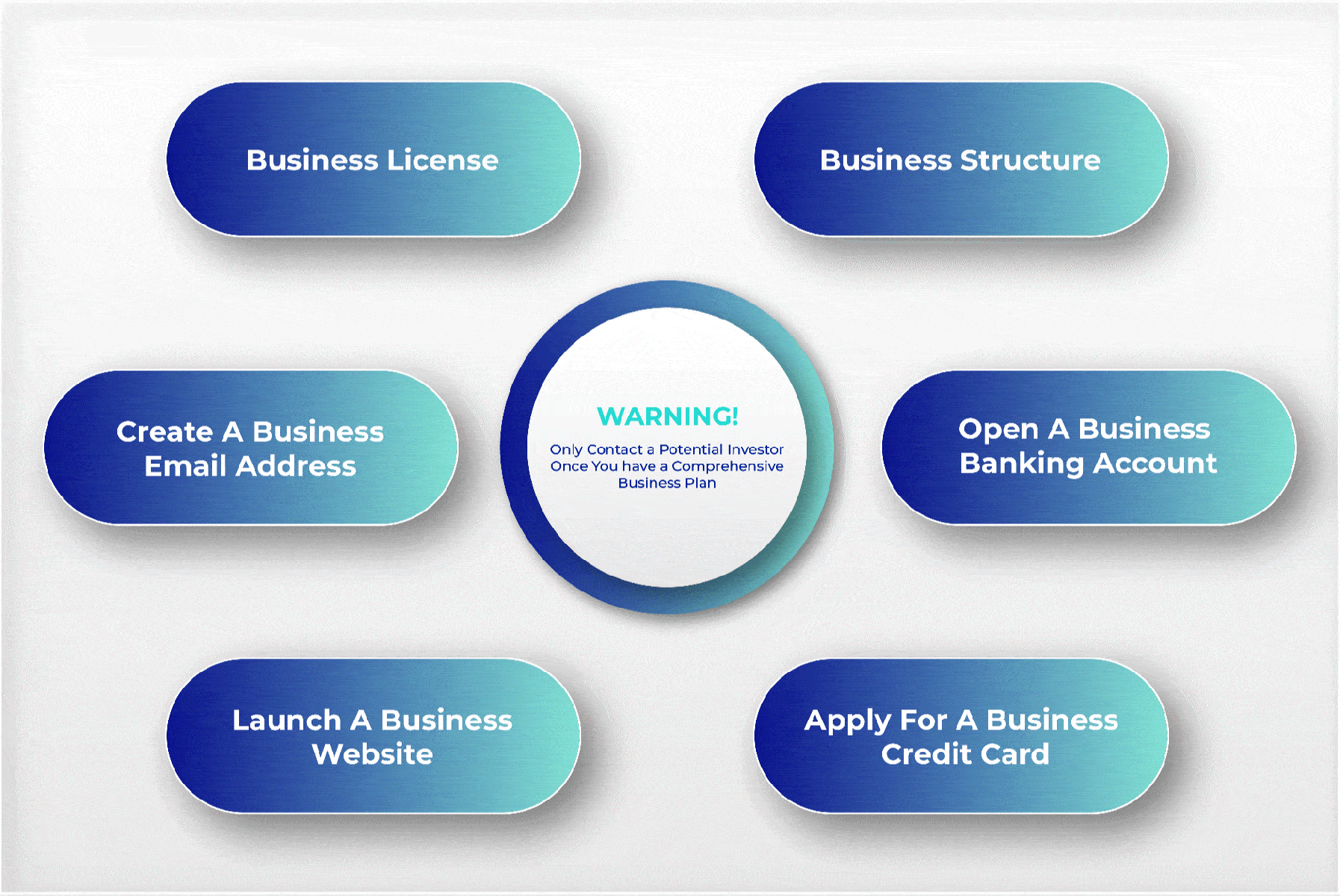| All content presented here and elsewhere is solely intended for informational purposes only. The reader is required to seek professional counsel before beginning any legal or financial endeavor. |

Starting a business requires money but what if, in addition to not having your own capital, you also don’t have any assets to provide as a guarantee for a loan ? Can you still acquire the financing to start a business? The answer is yes and this is achieved through grants and government programs designed specifically for people wanting to start their own business under these circumstances.
Video: How To Start A Business With No Money:
1. Small Business Administration (SBA) loan:
The U.S. Small Business Administration (SBA) helps small businesses obtain funding through different types of loans and is the first port of call on how to start a business without money.
- They back traditional loans made by banks for those that need a loan to start a business
- An SBA loan reduces the risk for lenders, allowing lenders to offer loans with lower qualification requirements than traditional funding.
- They can also point you in the right direction to receive professional advice on how to start a business without your own money.
Because of the government backing, these loans tend to be much easier to qualify for and usually have reasonable rates compared to other forms of financing. One thing to keep in mind is that they do involve some amount of government bureaucracy. You can expect to wait longer for approval and funding than other sources of financing.
2. Alternative Small Business Loans:
While most banks are hesitant to offer a grant to start a business that is not established, some alternative lenders specialize in loans for startup companies, financing equipment and covering opening costs, and other business needs. An alternative startup business loan may help you address your issue of how to raise capital for a startup.
- They approve customers for a loan to start a business when traditional banks would turn them away.
- Sometimes, you can get approved the same day and get instant access to the loan proceeds.
These loans are ideal for business owners that have some experience and know how these different types of financing work. Some alternative loan sources are crowdsourcing companies while others use peer-to-peer lending or are just typical lender to borrower loans.
Having a strong business plan or prototype product can also be a big help in getting approved with alternative loans.

3. Purchase Order Financing:
Purchase orders (POs) are what they sound like. A customer has requested to buy something from you and sent you an order detailing what they want to purchase. A PO usually details the date of delivery expected and the amount the borrower will pay.
If you have a PO you need to fulfill, but need funding to complete it, PO financing can help. For example, if you make widgets and someone orders 1,000 widgets, you can use PO financing to buy the raw materials that go into the widgets. PO financing has some pros and cons to consider:
- These lenders provide a portion of the money upfront in exchange for getting paid from the customer at a later date.
- This type of financing can be expensive, but it can be useful to grow your business.
4. Accounts Receivable Financing:
When you sell something to a customer, you might not receive cash right away. Instead, you send them an invoice detailing the amount owed and the date by which you must receive payment.
If you’ve made a sale and are waiting to receive payment, that balance gets added to your accounts receivable. The faster you can turn receivables into spendable cash, the better. However, sometimes, you can’t wait to get paid.
Accounts receivable financing is another expensive financing option. When you have delivered for a client and are waiting for payment on your invoice.
- The factoring company pays you today and gets paid from the client at a later date.

5. Friends and Family:
Family and friends can be a good way to get a financing to start a business. They know you and understand the skills and experience you have to make a successful business.
It’s important to keep in mind that mixing money with friends and family can cause headaches. You should be professional throughout the process and also make sure you can show your potential lenders a strong business plan.
- Terms and repayment can be messy with these types of loans, so it is best to create professional loan documents as if you were borrowing from a bank.
- This way everyone is on the same page with the terms of the loan.
6. Angel Investors:
Angel investors are typically retired industry veterans that want to invest their time, money, and experience into helping individuals with the steps to start a small business.
- In exchange for partial ownership of your company they'll provide the startup capital that you need to get your business up and running.
- They are available to answer questions and introduce you to customers, suppliers, and other contacts to accelerate the growth of your business.
Finding angel investors can be difficult, but there a few sources to check. There are many websites that can help connect angel investors with business owners. There are also local angel investors associations and business groups where you can make valuable contacts.
7. Credit Card 0% APR Offers:
One of the best steps to start a small business is by using 0% APR offers from a new startup credit card.
- Limited-time promotions allow you to make purchases on your card today and have up to one year (or longer) to repay them without owing any interest charges.
- Keep in mind that you must make minimum payments every month, otherwise, your promotional offer could expire early.
The drawback of these offers is that you typically need good credit to qualify and that borrowing limits will be significantly lower than for other types of loans. You also typically can’t use these to borrow cash. You can only use them to borrow money to spend on things you can buy with a credit card.
Additional Steps to Starting a Small Business

Warning: Don't contact potential investors and lenders until you have created a presentable business plan. Knowing how to start a business without money begins with approaching those that might lend you the money appropriately. A proper business plan is vital.
Business structure:
- You'll need to decide what type of business structure you'll have.
- Sole proprietorship, partnership, limited liability company (LLC), corporation or other types of structuers.
- A sole proprietorship is generally the cheapest and easier to get started. You can change your business structure in the future as business needs evolve.
Open a business banking account:
- This is where you'll deposit money received from customers and make payments related to the business.
- As balances increase, you can add a business savings account to earn interest and build a cash cushion.
Apply for a business credit card:
- You'll make accounting easier if you're able to track your expenses with a business credit card.
- This makes it easier to separate business and personal purchases.
Launch a business website:
- The website makes it easier for customers to find you and understand what products and services you offer.
- If you have e-commerce functionality, you can even generate revenue outside of business hours.
Create a business email address:
- Having a professional email address keeps communications separate from your personal email and provides more legitimacy to your business. An email from a Gmail address is not super professional and more likely to get caught in spam filters.
Business License:
- In some cities, you must have a business license to operate your business. Contact your City Hall to ask about local rules.
Legal Requirements to Start a Business
Apply for an Employer Identification Number (EIN):
- EIN number establishes your business separately from your Social Security number
- Doesn't matter if you never have another employee
- It creates your business profile
- Banks, investors, grants and other entities helping with the first steps to start a small business use this to identify your business. You can then work with them without having to share your Social Security number
- The IRS provides a free tool that will afford you an EIN number quickly and easily.
Additional requirements to start a business vary. However, you need to comply with legal obligations relating to business structure, employment and taxation.
Regarding the legal requirements for setting up a business there is no difference between knowing how to start a business without money or starting a business with money. Without the proper legal requirements either way is doomed from the start. It is vital you get this section down perfectly. This article will inform you about all the legal requirements for starting a business.